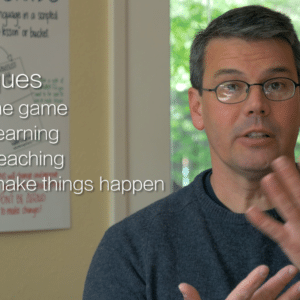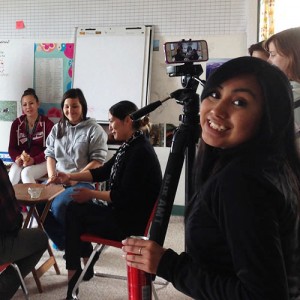[vimeo=19905263]
Here’s the second video in our Irish Language series. Start with the first one.
In order to take advantage of videos like this, you’ll need to have mastered the WAYK tutorial or played a WAYK game before.
It’s worth noting that, as always, we are applying tq mumble to leading a game in Irish – this is not perfect, fluent adult Irish, of any accent. But it is the Irish game that any new game leader will be leading for new players that come to Irish night.
Any mangling of Irish accent or language is on us as language hunters, not due to our fluent speaker Bob!
And yet being willing to chew through the first sounds and conversation in Irish is part of being a highly skilled language hunter – it will always be this way, for every new language we hunt.





Hi,
I’m Irish and endured many years of grammar/text-focussed mandatory schooling in this language but now I cannot speak it at all. To my ears some of your pronunciation sounds off, but that could be because I’ve had more exposure to the Munster & Connaught dialects not the Northern/Donegal one you seem to be drawing from.
Another point, does WAYK cover the filler phrases that each language has like “uh” “um” “em” “anō”? It would be a good element to include early on so people could signal that they are thinking of the right word. I don’t know what this is in conversational Irish.
An equally useful ingredient might be those “response tokens” (as linguist seem to call them) that we give back to speakers to indicate we are still listening and whether we agree (“uh huh”), disagree (“c’mon” “seriously”) or are surprised (“really?”)
Anyway thanks for this. Once I’ve done the full tutorial I might try this with my nieces who are still learning Irish in school.
boaby,
Thanks for your excellent questions – our pronunciation, as mentioned in the video, is mostly steered by Bob Burke, our fluent (but non-native) speaker.
However! One player, Bruce (like yourself, perhaps), has been studying Irish for a long time, and is only now getting a chance to really flex his conversational muscles – and the accent that he has learned.
Additionally, Patrick (on the right) is native Irish and endured the same Irish classes as you – and also has an accent that is it’s own creature. What you’re hearing is somewhat of an unfortunate mash-up of these three accents.
What we are doing is applying tq Mumble – “close enough is good enough”: we’re pursuing conversational ease, over a perfect accent, knowing that the accent will come later as we get the chance to hone in on particular fluent fools. We have a few lined up whose language we’re hoping to begin hunting soon.
WAYK absolutely encourages the “filler phrases” too – this is part of tq Over-do it, mimic-ing the fluent speaker.
Good luck, and please share your stories of Irish play with us – we’d love to hear them.
Yes, I guessed the emphasis was on fun and ease rather than pronunciation/accent.
As mentioned above I’ve had a lot of exposure (30+ years) to this language but can’t produce or understand it. It was a surprise to me, to be honest, to find in listening to your game I experience a kind of pain to hear pronunciation that jars with my idea of it’s music/prosody. This may also be a auditory bias on my side but it suggests a block that some players would have to deal with.
Another query for you on pronunciation: I’ve checked out several WAYK videos and a few podcasts but I’ve not yet seen you apply the playful and dual signing approach to get people to (directly or indirectly) tune into phonological aspects of languages. I know the emphasis is on play where players for the most part don’t stop to critique or assess their language production. But, I was just wondering whether the way WAYK asks players to invoke their childhood/playground self could be used to find playful auditory/vocal learning through techniques of lets say graduated tongue twisters, mimicry or extreme exaggeration of phonological aspects of a language. Just a thought for you.
boaby,
I understand the “auditory pain” you’re talking about – we’re looking forward to soon having a native fluent speaker with an accent we can hone in on.
Keep in mind, too, that if you find a fluent native irish speaker, we’d love to have you video this “same conversation” with them, and we’ll try out their accent in our game. We’re certainly not wedded to our odd mish-mash of american and irish accents. Let’s collaborate!
There are indeed a wealth of techniques for absorbing the pronunciation of the language, along with the particular accent. I’m not quite sure why they haven’t popped up on any of the podcasts or videos.
One technique, as I mentioned, is called Over-do it – the playful, extreme exaggeration of the native speakers (or game leader’s) sound and body language.
WAYK Tongue twisters show up as tq Two Words Same Sentence, wherein two (or three, or four, or more!) words that sound alike are combined into a sentence or paragraph that illuminates all the subtle differences between them. Players either learn these from game leaders or create them on the fly as they discover they’re hung up on a particular set of words.
OK. I’ll investigate those techniques. I’ll let you know if there is any chance of such a video, but I wouldn’t hold your breath. You may be surprised that even though I’m Irish and the language is in a precarious state, it’s not high on my language learning lust-list. In fact, I’m only just now getting curious about the language after having too many years of very, very negative associations/feelings about it. Such feelings are not so dominant among younger people here, so for my part I’m less interested in using WAYK to acquire Irish than to see if playing WAYK with my nieces may help them to a better start in their linguistic journey in Irish and also other languages.
A chara,
Tá sibh ag déanamh thar cionn. I’m a native Irish speaker and have no pain from listening to your pronounciations. It’s great to hear you all speak Irish when people in our own country pain me with their negative responses to our language. I’ve Connaught Irish with a Munster influence. No three people speak exactly the same where I live in the Gaeltacht so don’t worry about the dialect / accent thing. I also teach adult classes and find the light approach works best. Labhair í agus mairfidh sí.
Thanks Brid…
Yes we agree the light approach is best. As a matter of fact we believe very strongly that the entire goal of this community collaborative system is to command the techniques so well that even in the most difficult circumstances with the most difficult languages we can collectively find the lightest pathway to fluency possible. So light that it feels like nothing is happening, no learning is taking place, only laughter and sharing.
Thank you for letting everyone know the pronunciation in this video is not hurting your ears or pride. It means a lot to us to hear your approval as a native speaker. We love TQ:Mumble… close enough is good enough for now… even though we are trying to achieve pronunciation perfection we know it won’t happen under pressure or scolding.
Out of curiosity has WAYK improved your teaching? Which techniques did you use before you heard of WAYK? Which techniques have you employed since you discovered WAYK?
Willem,
You might find this recent radio documentary on city based people who raise their children as Irish speakers. Mostly in English with a few bits of Irish use by the subject families.
Best.
Sorry, completely forgot the link http://www.rte.ie/podcasts/2011/pc/pod-v-docononelanguage-pid0-2554776.mp3
Thanks Boaby – I’m really enjoying the audio documentary.